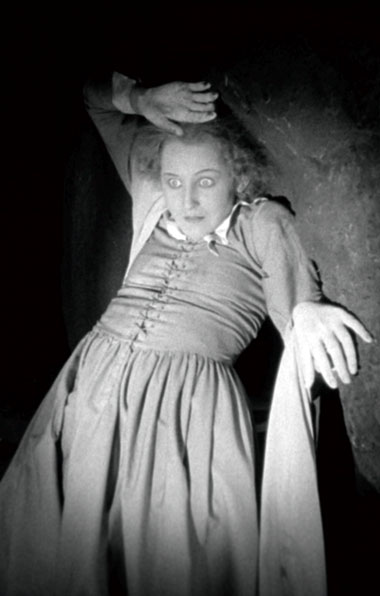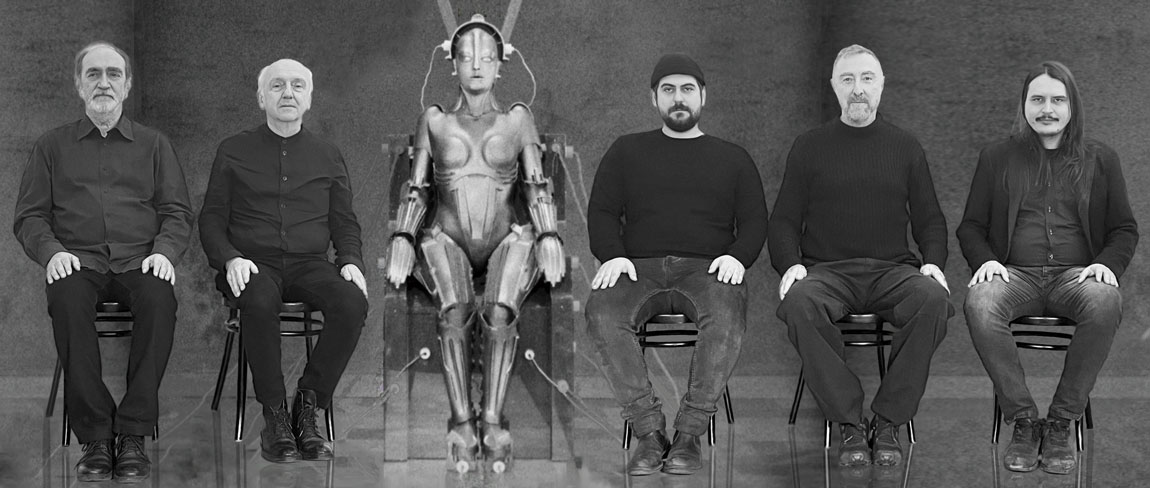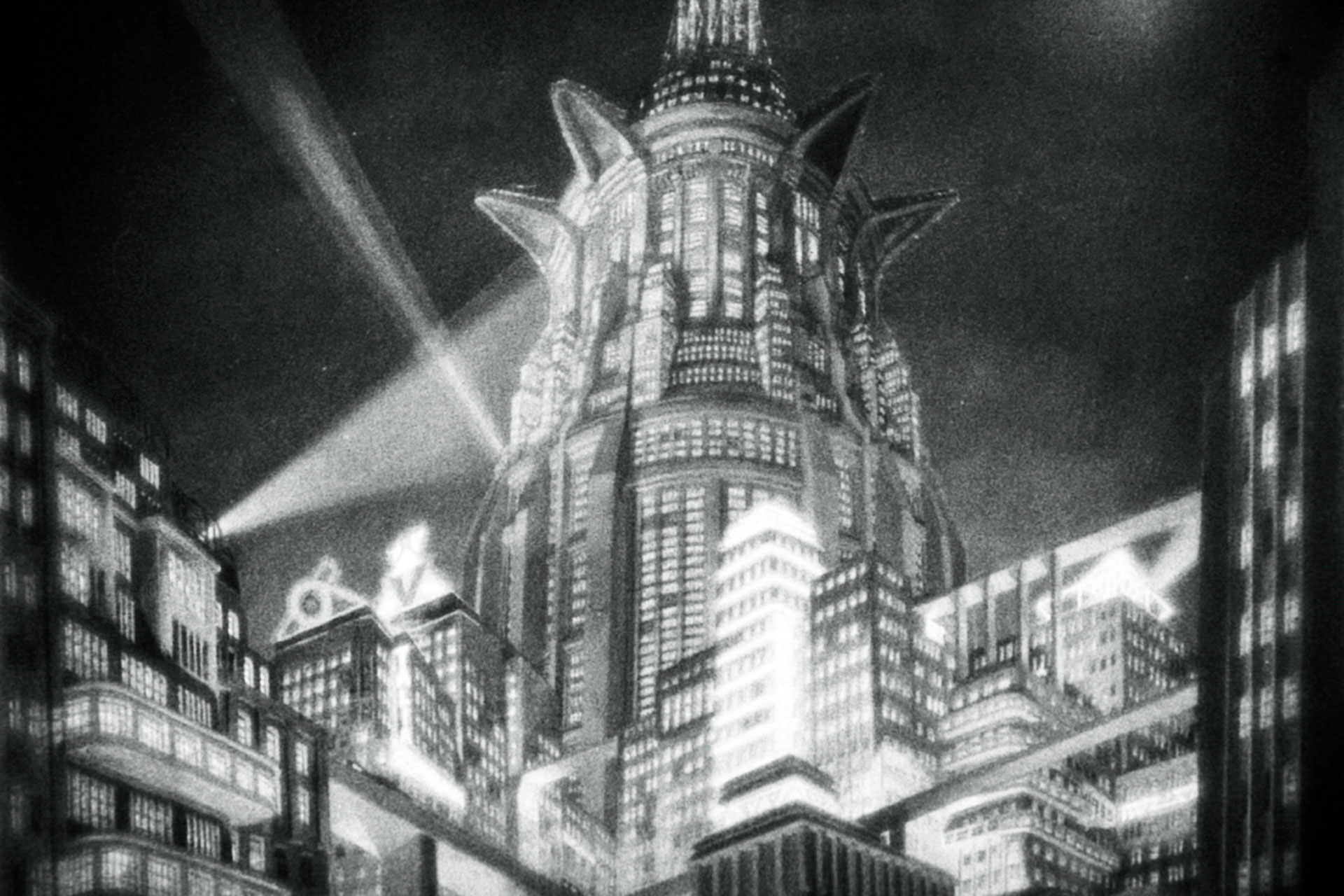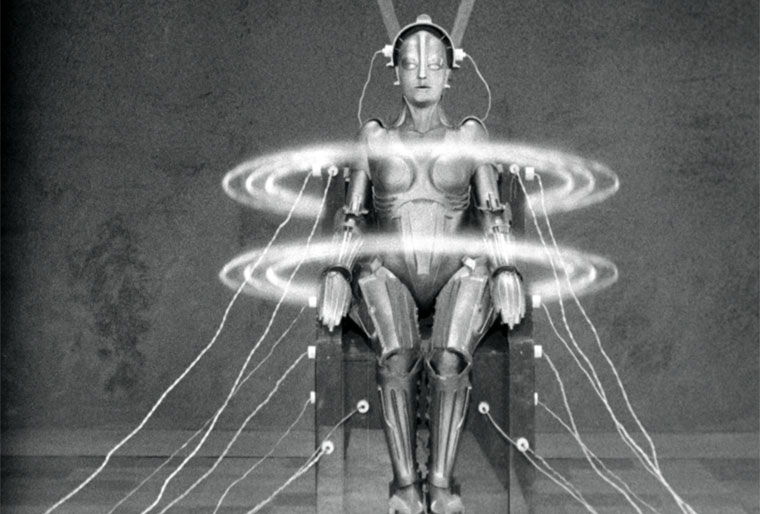Edison Studio Production
METROPOLIS (1927)
by Fritz Lang
restored version of 2010, duration 148 minutes
original soundtrack
created and performed live by
Mauro Cardi, Luigi Ceccarelli, Alessandro Cipriani, Vincenzo Core, Andrea Veneri
with the voices of Anna Clementi
and Martin Figura, Eric Moser, Marco Noia, Andreas Otto
Metropolis is a 1927 silent film directed by Fritz Lang, considered his masterpiece.
Lang sets the film in a dystopian future, in 2026, which is 100 years later than when it was written.
“Metropolis” is a big city, proud of its skyscrapers and its elevated streets, inhabited by very rich and largely idle people. But under its foundations there is another city, that of the workers, where throngs of slave-men work on gigantic machinery and colossal power plants.
The film is one of the symbolic works of expressionist cinema and is universally recognized as a model of much of modern science fiction cinema, having inspired films such as Blade Runner and Star Wars.
https://it.wikipedia.org/wiki/Metropolis_(film_1927)
screenplay Fritz Lang, Thea von Harbou
photography Karl Freund, Gunther Rittau
actors Alfred Abel, Gustav Frohlich, Brigitte Helm, Rudolf Klein-Rogge, Fritz Rasp, Olaf Storm, Theodor Loos, Erwin Biswanger, Heinrich George, Hans Leo Reich, Heinrich Gotho, Margarete Lanner, Max Dietze
restored by Friedrich-Wilhelm-Murnau-Stiftung, Wiesbaden
in collaboration with Deutsche Kinemathek – Museum for cinema and Television, Berlin
and Museo del Cine Pablo C, Ducros Hicken, Buenos Aires
production Milano Musica, Ravenna Festival, Festival di Nuova Consonanza
with the collaboration of Tempo Reale – Firenze
first performance
Milano, May 11 2023 | 8 pm
MEET Digital Culture Center – Theater
MILANO MUSICA 2023
Ravenna, June 16, 2023
Teatro Alighieri
RAVENNA FESTIVAL 2023
Roma, November 30, 2023
Parco della Musica, Teatro G. Borgna
60° Festival di Nuova Consonanza
Bisceglie (BT), December 21, 2023
Politeama Italia, Sonimage
After having created the soundtracks of some great silent film masterpieces, Edison studio is preparing to create the soundtrack of what is perhaps the most impressive and visionary of silent films: Fritz Lang’s Metropolis, in its most complete version ever found. , lasting two and a half hours. The futuristic and visionary character of the film lends itself perfectly to the creative work of Edison studio, based on the techniques of electroacoustic music, but very attentive to natural and instrumental sounds, used as a starting point for electronic processing ………


The soundtrack by Edison Studio for Metropolis
After numerous successful previous experiences with some great silent film masterpieces, in 2023 the collective of composers-performers Edison Studio produced a new original soundtrack of what is perhaps the most visionary of silent films: Metropolis, by Fritz Lang.
The film is presented here in its most complete version ever found, the result of a refined restoration work by the Alpha-Omega Digital GmbH laboratory in Munich, completed in 2010. Unanimously considered Fritz Lang’s masterpiece, Metropolis is counted among the symbolic works of expressionist cinema, and is universally recognized as a model for much of modern science fiction cinema, having inspired films such as Blade Runner and The Matrix.
For Metropolis Edison Studio takes up the ancient tradition of silent film with live musical accompaniment, creating an original composition that mixes and makes hundreds of sounds interact with each other: sounds created ad hoc, but also drawn from sound sources borrowed from nature and the history of music, bringing to the scene acoustic instruments, objets trouvés, mechanical and electronic instruments, vocal sounds, all orchestrated, transformed and spatialized live. The futuristic and visionary character of Fritz Lang’s film lends itself perfectly to the creative work of Edison Studio, based on the research and experimentation of possible and “impossible” sonorities that arise from the creative interaction with the film, sometimes expanding its poetic intentions, sometimes reinterpreting the dramaturgical-narrative horizon and the vast range of possible symbolic implications.
The composition of the soundtrack for Metropolis – as for any previous work for the cinema composed collectively by Edison Studio – was preceded by a long process of analysis of the structure and the dramaturgy film. Although inextricably linked to the dramaturgy of the film, the music for Metropolis does not conform completely to the film to be merely at its service, nor to give a realistic sound representation to the silent images by providing them with a voice or a sound. Rather, while respecting the director’s and screenwriter’s intentions, their poetics and the expressive tensions drawn in their work, the music for Metropolis aspires to be an expansion of Fritz Lang’s film. The rhythm of the images thus becomes “musical” in turn, reinventing its audiovisual time and highlighting otherwise hidden spaces and times.
The Metropolis soundtrack is therefore understood as a whole, in which even the extra-musical materials, those that could be reductively defined as “sound effects”, are an integral part of the music. And so are the verbal materials generated by the dialogues, which we have reconstructed, and for which we have referred to literary sources.
In fact the emotion of the voice, normally absent in silent films, is often restored here, sometimes disregarding the strictly verbal content, other times starting from the naturalistic sound of the words and using it to give an identity that is not only emotional but also properly musical to the various characters and stage situations. A music therefore understood as a whole as “organized sound”, referring to the thought of Edgar Varèse.
In the interaction between live music and silent film, in relationships of parallelism or opposition, significant processes are produced in the domain of audiovisual time and space, as well as in the general interpretation of the work. In particular, the work on the sound space, created by Edison Studio in surround 7.1, creates immersive dimensions that relate to the different levels of the Metropolis space. The sound, impossible to create in the 1920s, is imagined and reinvented, and in this way it can be heard today, in the 2000s, the years in which, among other things, the story of Metropolis is set.
A particular sound space was created for each setting in the film: the upper city of the rich, inspired by futuristic architectural models and built at the time with avant-garde techniques; Yoshiwara, the pleasure house in the Metropolis entertainment area; the city of workers, dark and located underground; the immense and visually extraordinary factory, with the “machine M” which rhythmically marks the inhuman work of the workers and the clocks which relentlessly count down the ten working hours; the catacombs, located on a third level below the city of the workers, where they meet clandestinely; the eternal gardens, where the children of the rich enjoy themselves unaware of the existence of the lower levels.
The design of the sound environment and the music that interacts with the characters, the dialogues, and the actions within which the scenes develop, generate an overlapping of different sound layers. The formal organization therefore represents a synthesis of the counterpoint and the dialectic that is established between the superimposed audiovisual layers, within the general architecture designed by the narrative structure of this masterpiece.


